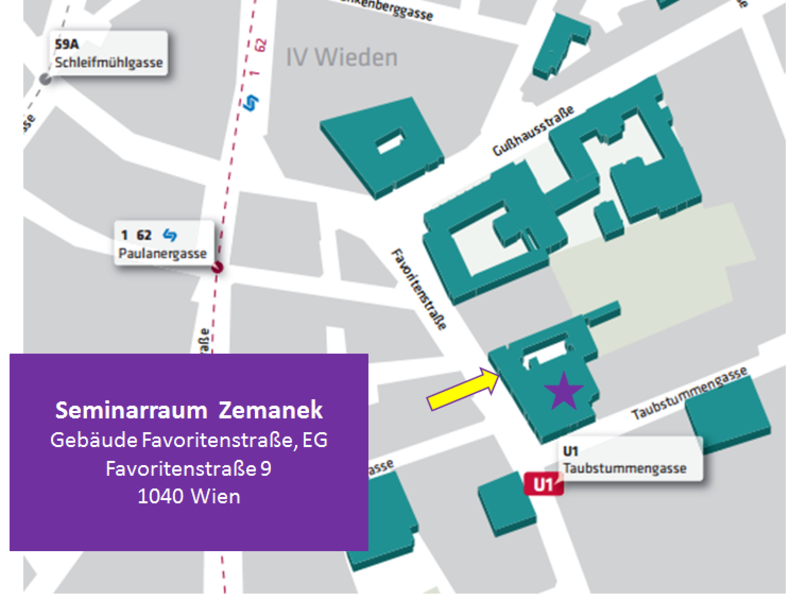Workshop on Fuzzy Quantifiers and Related Topics
Vienna, December 15 - 16, 2017
TU Vienna
Insitute of Computer Languages - Theory and Logic Group
 Venue
Venue
The workshop will take place at the TU Vienna in Favoritenstraße 9-11, Seminar Room "Zemanek", ground floor. Due to construction works, we advise to access the building through the entrance in Favoritenstraße 11.

 Registration
Registration
Participation is free of charge. If you are interested in joining, please send an email to
baldi@logic.at.
 Schedule
Schedule
Friday, December 15 -- 15:00-18:10
| 15:00 - 15:30 |
A. Vidal, R. Horcik, T. Moraschini |
An Algebraic Approach to Valued Constraint Satisfaction
[Abstract]
We study the complexity of the valued CSP (VCSP, for short) over arbitrary templates, taking the general framework of integral bounded linearly order monoids as valuation structures. The objective is to show an approach to the problem more related to many-valued logics, in order to generalize more naturally results from classical CSP. Restricting to locally finite monoids, we introduce a notion of polymorphism that captures the pp-definability (crucial in the definition of CSP) in the style of Geiger’s result. As a consequence, sufficient conditions for tractability of the classical CSP, related to the existence of certain polymorphisms, are shown to serve also for the valued case. Finally, we establish the dichotomy conjecture for the VCSP, modulo the dichotomy for classical CSP.
|
| 15:30 - 15:50 |
L. Behounek, O. Majer |
Fuzzy intensional semantics 1 - Apparatus
[Abstract]
We will present intensional fuzzy semantics as a straightforward
weighted generalization of classical intensional models; describe
its formalization in higher-order fuzzy logic by means of syntactic
interpretation; demonstrate the match between intensional and formal
models; and outline the method of expanding the syntax by intensional
operators and the semantics by additional structure on models.
|
| 15:50 - 16:10 |
L. Behounek, O. Majer |
Fuzzy intensional semantics 2 - Applications
[Abstract]
We will illustrate the applicability of fuzzy intensional semantics
on a few examples: we will elaborate in some detail two variants
of fuzzy modal logic S5 and briefly sketch further application areas,
including fuzzy modalities, counterfactuals, probability, and fuzzy
quantifiers.
|
| 16:10 - 16:40 |
Coffee Break |
|
| 16:40 - 17:25 |
P. Cintula, C. Noguera |
Neighbourhood Semantics for Modal Fuzzy Logics
[Abstract]
In this talk we outline the first results in the development of
neighbourhood semantics for modal fuzzy logics, relate it to the usual
Kripke-style semantics, prove general completeness theorem for a fuzzy
variant of E, and generalize the semantics in order to obtain
modal-completeness of all axiomatic extension of E.
|
| 17:25 - 18:10 |
P. Cintula, C. Noguera |
Fuzzy logics with integral quantifiers
[Abstract]
In this talk, we revisit a theory of generalized quantifiers over Rational
Pavelka Logic interpreted in a probabilist manner, introduced by Petr Hajek
in chapter VIII of his seminal monograph. We solve an open problem stated
there, transfer the result to a weaker logical setting (without truth
constants) and outline a general theory of fuzzy logics with integral
quantifiers.
|
Saturday, December 16 -- 10:00-12:30
| 10:00 - 10:30 |
I. Sedlár, A. Vidal |
Non-structural many-valued modal logics
[Abstract]
Substitution invariance (a.k.a. structurality) is usually considered to be a necessary feature of any (formal) logic. However, influences from fields such as AI sometimes undermine this position. The structurality requirement seems less plausible when logical systems modeling the characteristics of specific structures are considered. In this talk, we demonstrate this point by outlining two families of many-valued modal logics. Firstly, we discuss a family of modal logics formalizing reasoning about labelled weighted graphs. Models for these logics are Kripke models with a many-valued accessibility relation but a two-valued evaluation of propositional variables. The second family of logics we discuss are some many-valued generalizations of epistemic logic. Here we consider usual many-valued Kripke models where, however, validity is defined as truth in all "possible worlds" of the model, i.e. states where both evaluation of variables and accessibility of other states are two-valued. Some preliminary axiomatization results are pointed out
|
| 10:30 - 11:00 |
L. Godo |
On Reasoning with Vague Quantifiers: One Old Approach and Some Preliminary Ideas.
[Abstract]
|
| 11:00 - 11:30 |
Coffee Break |
|
| 11:30 - 12:00 |
T. Moraschini, R. Jansana, J.G. Raftery |
General relational semantics for deductive systems
[Abstract]
It is well known that every propositional logic has an algebraic semantics. On the other, well-behaved logics tend to have relational semantics as well. Despite the fact that relational semantics have been considered to provide "meaning" to logics (in opposition to algebraic semantics, which has been criticized as a kind of syntax in disguise), the evolution of the general theory of relational semantics is far behind that of algebraic semantics. In this talk we present a first abstract approach to relational semantics, in the spirit of abstract algebraic logic. For the sake of simplicity, we will confine our discussion to the local aspects of relational semantics, which turns out to be deeply connected with the theory of completions of ordered algebras.
|
| 12:00 - 12:30 |
P. Baldi, C. Fermüller, M. Hofer |
Discussion on Quantifier Fuzzyfication Mechanisms.
[Abstract]
|
 Dinner
Dinner
The workshop dinner will take place on Friday, December 15, at 19:00, at the restaurant
D'Landsknecht .
The workshop's local organizers are:
- Chris Fermüller (TU Vienna) [Website]
- Paolo Baldi (TU Vienna) [Website]
To contact the organizers, send an email to
baldi@logic.at.


 Venue
Venue
 Registration
Registration  Schedule
Schedule  Dinner
Dinner  Contact
Contact